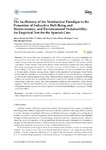Mostrar o rexistro simple do ítem
The Inefficiency of the Neoclassical Paradigm in the Promotion of Subjective Well-Being and Socioeconomic, and Environmental Sustainability: An Empirical Test for the Spanish Case
| dc.contributor.author | Membiela-Pollán, Matías | |
| dc.contributor.author | Alló, María | |
| dc.contributor.author | Pateiro-Rodríguez, Carlos | |
| dc.contributor.author | Blazquez-Lozano, F. | |
| dc.date.accessioned | 2023-12-27T11:31:27Z | |
| dc.date.available | 2023-12-27T11:31:27Z | |
| dc.date.issued | 2019 | |
| dc.identifier.citation | Membiela-Pollán, M.; Alló-Pazos, M.; Pateiro-Rodríguez, C.; Blázquez-Lozano, F. The Inefficiency of the Neoclassical Paradigm in the Promotion of Subjective Well-Being and Socioeconomic, and Environmental Sustainability: An Empirical Test for the Spanish Case. Sustainability 2019, 11, 7102. https://doi.org/10.3390/su11247102 | es_ES |
| dc.identifier.issn | 2071-1050 | |
| dc.identifier.uri | http://hdl.handle.net/2183/34660 | |
| dc.description.abstract | [Abstract] The recent literature developed in the field of happiness economics highlights the overvaluation of income and material prosperity as determinants of happiness, and calls into question many of the assumptions of traditional economic theory linked to “rationality” and the “non-satiety” of the consumer. This article aimed to study which factors explain individual subjective well-being, paying special attention to the role of income and the incidence of social variables and focusing on the case of Spain. As a novelty, this research introduces variables such as trust or the perception of justice, among others. Based on the analysis of the European Social Survey and through the estimation of an ordered logit, we find that, in line with the theory of happiness economics, the material aspects do not play a relevant role as explanatory of subjective well-being, unlike social aspects, such as sociability and trust in people (social capital). In addition, our results indicate that in the case of Spain, the most materialistic people are associated with a lower level of happiness. Thus, it seems that the excess of concern for material and economic issues in the pursuit of happiness undermines socioeconomic and environmental sustainability by causing the “wealth destruction effect”. | es_ES |
| dc.language.iso | eng | es_ES |
| dc.publisher | MDPI | es_ES |
| dc.relation.uri | https://doi.org/10.3390/su11247102 | es_ES |
| dc.rights | Attribution 4.0 International (CC BY 4.0) | es_ES |
| dc.rights.uri | http://creativecommons.org/licenses/by/3.0/es/ | * |
| dc.subject | Neoclassical paradigm | es_ES |
| dc.subject | Material prosperity | es_ES |
| dc.subject | Subjective well-being | es_ES |
| dc.subject | Interpersonal relationships | es_ES |
| dc.subject | Easterlin’s paradox | es_ES |
| dc.subject | Sustainability | es_ES |
| dc.title | The Inefficiency of the Neoclassical Paradigm in the Promotion of Subjective Well-Being and Socioeconomic, and Environmental Sustainability: An Empirical Test for the Spanish Case | es_ES |
| dc.type | info:eu-repo/semantics/article | es_ES |
| dc.rights.access | info:eu-repo/semantics/openAccess | es_ES |
| UDC.journalTitle | Sustainability | es_ES |
| UDC.volume | 11 | es_ES |
| UDC.issue | 24 | es_ES |
| UDC.startPage | 7102 | es_ES |
| dc.identifier.doi | https://doi.org/10.3390/su11247102 |
Ficheiros no ítem
Este ítem aparece na(s) seguinte(s) colección(s)
-
GI-iMARKA - Artigos [37]






